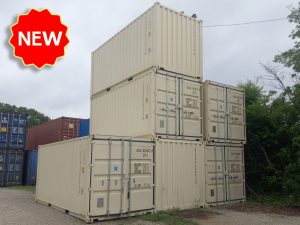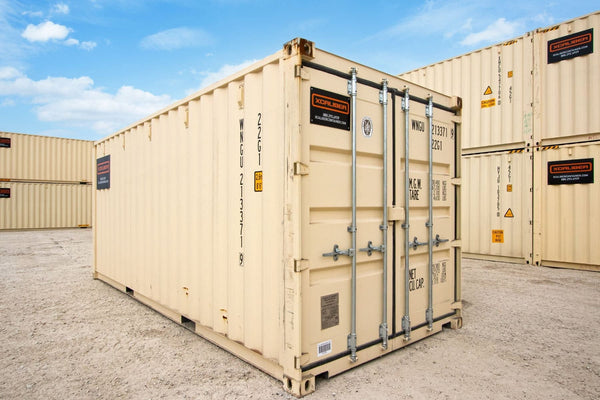How to Rent New Shipping Container 40 x 8 x 9.6 and Turn It Into a Portable Café
How to Rent New Shipping Container 40 x 8 x 9.6 and Turn It Into a Portable Café
Blog Article
The Ultimate Overview to Selecting the Right Shipping Container for Your Demands
When it comes to choosing the right shipping container, comprehending your details needs is vital. You'll desire to consider elements like dimension, kind, and product to ensure you make the ideal selection. From conventional sizes to specialized alternatives, there's a great deal to check out. And also, budgeting for both the container and any adjustments can make a large distinction. Allow's break down the key elements to assist you discover the best suitable for your demands.
Understanding Shipping Container Sizes
When you're selecting a shipping container, recognizing the various dimensions readily available is critical for making the right choice. Shipping containers normally can be found in common lengths of 20 and 40 feet, however you'll also find various other measurements. Recognizing the dimension you need depends upon what you prepare to shop or transport.If you're relocating smaller sized products, a 20-foot container may be ideal, while larger deliveries often call for a 40-foot container. Bear in mind that the elevation can additionally vary; high cube containers offer added upright space, which can be advantageous for taller goods - Rent New Shipping Container 40' x 8' x 9’6".Before determining, determine your freight, and consider exactly how much room you'll need for filling and unloading. Always consider potential future demands-- choosing a somewhat bigger container may save you trouble down the line. Ultimately, picking the appropriate dimension will enhance effectiveness and ensure your things are secure during transportation
Kinds of Delivery Containers Available
There are numerous sorts of shipping containers available, each developed for details purposes and freight demands. The conventional completely dry container is versatile, ideal for general cargo. If you're shipping disposable items, consider a cooled container, which preserves a controlled temperature. For oversized items, high dice containers provide extra height, accommodating taller loads.If you need to transfer heavy equipment or tools, level rack containers supply a sturdy base without wall surfaces. Open-top containers allow for simple loading of tall freight, with a removable tarp covering for protection. If you're searching for versatility, consider a collapsible container that can be easily stored when not in use.Lastly, specialized containers like container containers are made use of for fluids, while vented containers are developed for bulk cargo that requires air flow. Understanding your cargo type will aid you choose the ideal container to meet your shipping requires effectively.
Material Factors To Consider for Durability
When selecting a shipping container, the material plays a vital duty in its toughness. You'll want to consider the advantages of steel versus aluminum, especially pertaining to corrosion resistance. Understanding these factors can aid you make an extra informed option for your delivery needs.
Steel vs. Light weight aluminum Containers
Just how do you choose between steel and aluminum containers for your shipping needs? Begin by taking into consideration sturdiness. Steel containers are durable and offer superb stamina, making them optimal for heavy tons and extreme problems. They withstand damages from effects and are frequently cheaper, which can be a significant aspect for budget-conscious buyers.On the various other hand, light weight aluminum containers are lightweight, which can save you on shipping prices. They're simpler to steer and are a great choice if you need to carry products frequently. Light weight aluminum is usually more costly and less robust than steel. Consider your details requirements carefully, including weight, price, and the sort of freight you'll be delivery, to make the ideal choice for your circumstance.
Corrosion Resistance Aspects
Picking the ideal product does not simply involve weight and price; corrosion resistance plays a considerable duty in longevity. When choosing a shipping container, take into consideration the atmosphere it'll deal with. Steel containers, while solid, can rust if not appropriately treated. Look for options with protective coverings or galvanization to enhance their life expectancy. Aluminum, on the various other hand, supplies natural deterioration resistance, making it perfect for seaside locations or moist problems. It can be more expensive. Furthermore, assess the container's usage-- if it'll be revealed to chemicals or harsh climate, focus on products that can stand up to these conditions. Buying a corrosion-resistant container currently can save you from expensive repairs or substitutes down the line. Select wisely for long-lasting benefits.
Modifications and Personalization Options
Shipping containers aren't just for carrying products; they can be transformed to fulfill your certain needs through various modifications and modification options. You can convert a standard container into a relaxing office, a momentary retail store, and even a personal gym. The possibilities are almost endless.Think regarding including home windows, insulation, or air flow to boost comfort. You could also think about see post electric circuitry, pipes, or perhaps personalized shelving to improve functionality. If protection's a concern, enhanced locks can supply tranquility of mind.For visual appeal, you can paint the container or include a special design to make it stick out. Do not forget floor covering options-- whether you want resilient plywood or something extra sophisticated, it can elevate the space.Ultimately, tailoring your delivery container to match your needs can boost use and produce an unique setting that mirrors your design.
Evaluating Your Transport Requirements
When it involves using your modified shipping container, understanding your transportation needs is vital. Beginning by determining what you'll be shipping-- whether it's heavy tools, retail goods, or personal things. Each sort of freight has various needs concerning size, weight, and accessibility.Next, consider the range and mode of transportation. Are you shipping in your area, across the country, or worldwide? This influences the container's layout and capability. If you're utilizing trucks, ensure your container fits standard measurements for easy loading and unloading.Additionally, believe regarding transit conditions. Will your things require special defense from weather or temperature level changes? If so, you might need insulation or air flow attributes in your container.Lastly, examine just how often you'll be delivering products. Constant shipments may need a more durable and flexible container to satisfy ongoing demands. By addressing these factors, you'll be well-prepared to choose the right shipping container for your demands.
Budgeting for Your Shipping Container
Establishing a budget for your delivery container is vital for guaranteeing a smooth purchasing procedure. First, establish exactly how much you can pay for to invest. Remember that costs can vary substantially based on dimension, problem, and kind. New containers normally set you back a lot more, but used ones can use significant savings.Next, think about any kind of extra prices you might incur, such as transport fees, delivery charges, and modifications. If you intend to click here for info customize the container, consider those expenditures as well. Study various providers to compare costs and find the finest offer that fulfills your needs.Don' t fail to remember to include any permits or guidelines that may put on your acquisition and usage of the container. By plainly outlining your budget plan, you'll be much better prepared to make enlightened decisions, ensuring you get the best container without breaking the bank.
Maintenance and Look After Long life
To guarantee your shipping container lasts for many years, normal upkeep is essential. Beginning by examining the exterior for rust, dents, and damage. If you identify any kind of issues, address them instantly to prevent further deterioration. Clean the container regularly, both inside and out, to get rid of dirt, particles, and wetness that can result in corrosion.Ensure the doors secure effectively and oil the joints to prevent corrosion and sticking. If you're making use of the container for storage space, consider adding ventilation to decrease humidity and mold growth. For extra security, use a rust-inhibiting paint or sealer annually.If your container's located in an extreme environment, like seaside locations, you may need to raise upkeep regularity. Watch on the flooring, too; any signs of wear must be repaired immediately. With these straightforward actions, you'll expand the life of your delivery container substantially.
Often Asked Questions
How Do I Find a Reliable Delivery Container Distributor?
To directory discover a dependable shipping container provider, begin by researching on-line testimonials, requesting for referrals from pals or market contacts, and comparing rates. Constantly examine their qualifications and warranty they provide high quality containers that meet your demands.

Can I Rental Fee a Shipping Container Rather of Buying?
Yes, you can absolutely rent out a delivery container instead of purchasing one. Many vendors offer rental alternatives, which can save you money and offer adaptability if you only require it for a short period.
What Permits Are Needed for Container Placement?

Are Shipping Containers Weatherproof and Suitable for Outdoor Storage?
Yes, delivering containers are generally weatherproof, developed to endure rough problems. Their durable construction keeps your items secure and dry, making them appropriate for exterior storage. Simply assure correct air flow to stop dampness build-up inside.
Exactly how Do I Transfer a Delivery Container As Soon As Acquired?

Report this page